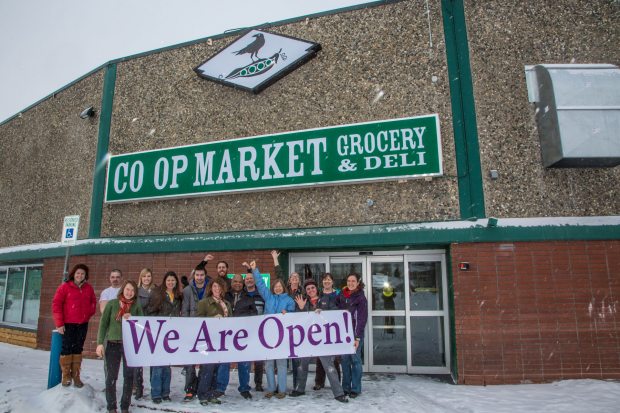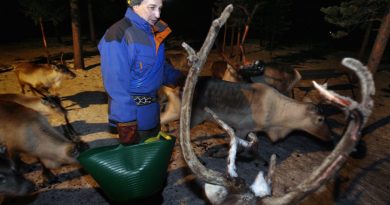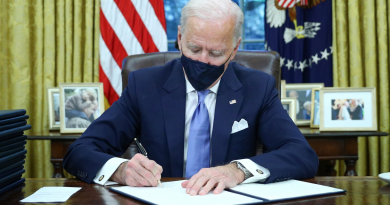Fairbanks, Alaska Co-Op open for business
 After six years, countless fundraising events and meticulous planning, the Fairbanks Co-Op Market has opened its doors to the Interior community, becoming the only cooperative grocery store in the state.
After six years, countless fundraising events and meticulous planning, the Fairbanks Co-Op Market has opened its doors to the Interior community, becoming the only cooperative grocery store in the state.
Food cooperatives — a member-owned enterprise where customers buy in to become a legal part-owner of the store — are common in the Lower 48, but in Alaska, it’s a different story.
In a state where the vast majority of food is barged in, shipping costs can be prohibitive, and locating goods that are sourced nearby can also be a challenge.
While this is not the first food co-op in Alaska — The coastal community of Sitka boasts the most successful fishing co-op in the nation, the Seafood Producer’s Cooperative, and the Sitka Food Co-Op, a small-scale cooperative — This is the first co-op grocery store to open in the last 20 years in the state, said Andrew Crow, manager of the co-op development program at UAA.
Crow has been working with the Fairbanks Co-Op Market since it incorporated in 2007. He said it’s exciting to have “watched it go from a conversation to an actual store.”
The Fairbanks Co-Op Market works like this: Pay in $200 for a lifetime membership, and in return, receive 20 percent back from the money you spend in the store over the course of a year — once the co-op becomes profitable, that is. So if a customer spends $100 in a year at the co-op, they can expect a $20 dividend back at the end of that year.
Those returns should start rolling out in around 5 years, said co-op director Mary Christensen. In the meantime, members will be offered other perks such as in-store discounts, and discounts for cooking classes the co-op will be developing. Still, you need not be a member in order to shop there.
The co-op has all the departments one would expect in a regular grocery store, except the emphasis is on stocking the shelves with local and organic products. Meat and seafood, produce, dairy, bulk food, coffee and a wellness department are all packed into the 6,000-square-foot space. So far, the store is sourcing its meats from Huffman Ranch in Fairbanks and Indian Valley Meats, near Anchorage. Tanner crab comes from Kodiak, and salmon is sourced from the Copper River. Local Fairbanks farms, including Rosie Creek Farm, Basically Basil and Johnson Family Farm, supply the store with microgreens, potatoes, onions, and will provide more varied produce as the snow melts and growing season begins.
The co-op occupies the long-abandoned Foodland Building in downtown Fairbanks, which has remained unused since the grocery store closed down in the 1990s. So far, the co-op comprises only 20 percent of the building. Christensen is not sure yet whether they’ll look to expand.
The store’s location also fills a gap as the only grocery store in downtown Fairbanks. That was part of the plan, Christensen said, and one of aspects they evaluated while putting together their business model.
Overcoming skepticism
The co-op’s meticulous planning has spanned years, and oddly enough, may be part of the reason the project was met with some skepticism by the community. “They’ve been in full fundraising mode for years,” Crow said. That may have led to the perception that the co-op wasn’t making any headway.
Christensen wasn’t deterred by the naysayers, however.
“I don’t take much stock in that kind of skepticism,” she said.
“We went about it the right way. We took our time, we developed it in partnership with industry experts.” All that work take a long time to culminate, she said.
Countless potlucks, fundraisers and project meetings later, the co-op has secured more than 1,500 initial members, and has raised more than $1 million, pulling in money from memberships, fundraising events, a USDA grant and conventional loans.
Crow agreed that the long process behind forming the co-op was the right way to go about it. It’s not unusual for co-ops to take five years to come together, he said, and the Fairbanks Co-Op was particularly methodical in following the business plans developed by the consulting firms it worked with.
Going forward, the biggest challenge the co-op is facing is “staying up with the demands of our customers,” Christensen said.
“We’ve had really busy days” since opening on March 23, and “we’re not quite ready,” Christensen said. They still have prices to adjust, labels to slap on their products, and positions to fill. But, high demand is one of the best challenges their fledging business could have.
The Fairbanks Co-Op joins the Homegrown Market, a deli offering local meats some other local products, as the second store offering local food in the Interior year-round. So why does the Fairbanks North Star Borough, with less than a third of the population of Anchorage, have these local stores while Alaska’s largest city has no comparable offerings?
Crow said alternatives such as New Sagaya and Natural Pantry, which offer similar products, have so far dominated the Anchorage market, while in Fairbanks, there are no alternative grocery stores.
The co-op decided “we kind of have to do this ourselves,” Crow explained.
Christensen envisions the co-op as a place where Fairbanksans can come together and rally around a community-owned project. What she values most in the co-op is “being able to recognize people and call them by name. You can’t do that in a large store.”
Contact Laurel Andrews at laurel(at)alaskadispatch.com
For more stories from Alaska Dispatch, click here



